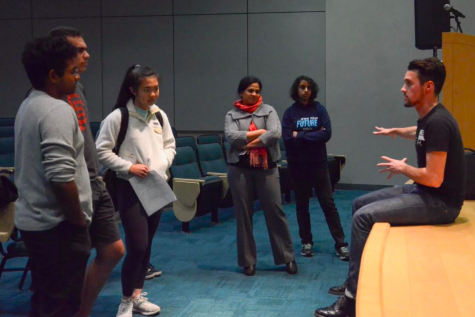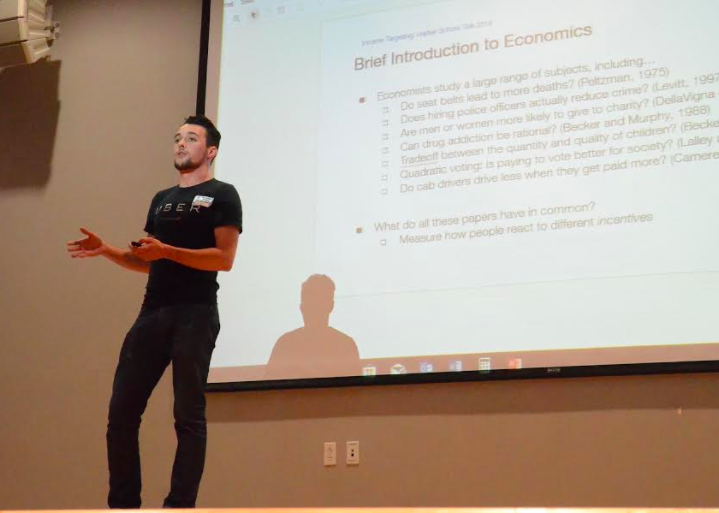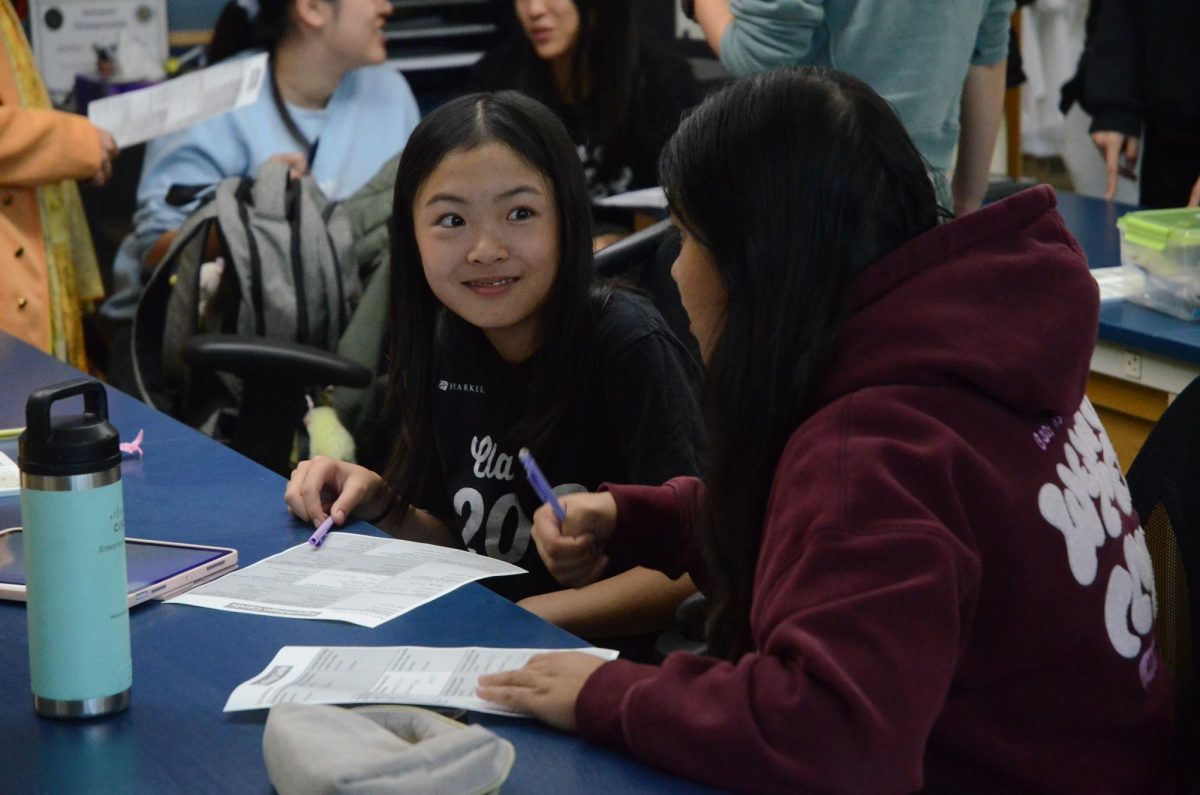Michael Sheldon speaks on relationship between Uber driver responsiveness and income shocks
Emily Chen
Sheldon gives a brief introduction to the application of economics to various industries. Sheldon spoke at Harker in the Nichols Auditorium on Feb. 6 during long lunch.
February 10, 2018
With white block letters UBER plastered across his solid black T-shirt, Michael Sheldon stands on Nichols’s stage as the students fill the seats of the auditorium. Carrying a pencil in one hand with a notepad or computer in the other, the students take detailed notes while intently listening to Sheldon’s presentation.
Michael Sheldon visited Harker and presented a speech on behavioral economics in the Nichols Auditorium on Feb. 6. Sheldon, a data scientist at Uber, has spent the past two years researching driver pricing problems and setting designs that would result in the most efficient supply at any given time or area. From the advanced data that Uber provides, Sheldon gathers the statistics throughout the world, resulting in various comparisons between these different regions.
“Uber presents a lot of interesting economic opportunities,” Sheldon said. “I love economic research, and I’ve always have. Uber is a unique place to study this. It’s a two-sided market, and it presents different challenges and approaches that you wouldn’t encounter in a classical setting. It also presents opportunities to study other things just because of the sample size and resources that you just don’t have access to anywhere else.”
Inspired by the possibilities that Uber’s technologies can create, Sheldon notices the recent revolutionary discoveries and strives to develop his own personal skills and techniques.
“On a more external level, I’ve always strongly believed in the Uber product itself. I was in college when it first came out, and I went to the University of Chicago, which is quite a bit away from downtown. It used to take me two or three hours to get a cab to go to the airport, and you never knew for sure if that cab was going to come,” Sheldon said. “I genuinely believe in the Uber product and how revolutionary it’s been.”
During his presentation, Sheldon utilized different analogies to reflect the significance of data statistics on human reaction towards different situations. In addition, he mentioned various scenarios regarding economics and related them to real-life examples. As the first industry speaker for economics at Harker, Sheldon demonstrated for the first time how economic principles learned in the classroom can influence and carry over to the real world.
“From my small background of introductory economics, I already knew that economists studied incentives and reactions to them,” Allison Lee (10) said. “ I wasn’t prepared for how economics could be applicable to such a large variety of subjects that are in our everyday lives. I think the way he explained people’s behavior was very interesting. He went through different ways of thinking about economics, and that just added depth to his argument.”
Looking towards the future, Sheldon displays his excitement for the many inventions to come, whether it’s from Uber or any other company. Having already experienced the field of researching economics as a data scientist, he offers advice and suggestions to help those striving to accomplish achievements within this realm.
“For a lot of economists and tech, it’s an exciting time because these goals are all pretty new,” Sheldon said. “There hasn’t been a lot of expertise in this field before, which makes it difficult because there’s no record of previous examples or good learnings that I can take away from. That being said, more and more people with economic backgrounds who can code are finding really good opportunities. Having good intuitions but also being able to translate that into a way that a company can use a leverage and build off of is really important going forward. No matter where you’re going into, computer science is a great background to have, and it’s especially important for economics right now. Like Uber, there are several new innovative companies that are changing how we use the most basic products, so I’m just personally excited to be part of the development that helps to innovate and use the skills in a way that is both intellectually stimulating and drives this economic idea to bring greater innovation.”

Sheldon stays after his talk to answer students’ questions. Sheldon spoke at Harker in the Nichols Auditorium on Feb. 6 during long lunch.


















![“[Building nerf blasters] became this outlet of creativity for me that hasn't been matched by anything else. The process [of] making a build complete to your desire is such a painstakingly difficult process, but I've had to learn from [the skills needed from] soldering to proper painting. There's so many different options for everything, if you think about it, it exists. The best part is [that] if it doesn't exist, you can build it yourself," Ishaan Parate said.](https://harkeraquila.com/wp-content/uploads/2022/08/DSC_8149-900x604.jpg)




![“When I came into high school, I was ready to be a follower. But DECA was a game changer for me. It helped me overcome my fear of public speaking, and it's played such a major role in who I've become today. To be able to successfully lead a chapter of 150 students, an officer team and be one of the upperclassmen I once really admired is something I'm [really] proud of,” Anvitha Tummala ('21) said.](https://harkeraquila.com/wp-content/uploads/2021/07/Screen-Shot-2021-07-25-at-9.50.05-AM-900x594.png)







![“I think getting up in the morning and having a sense of purpose [is exciting]. I think without a certain amount of drive, life is kind of obsolete and mundane, and I think having that every single day is what makes each day unique and kind of makes life exciting,” Neymika Jain (12) said.](https://harkeraquila.com/wp-content/uploads/2017/06/Screen-Shot-2017-06-03-at-4.54.16-PM.png)








![“My slogan is ‘slow feet, don’t eat, and I’m hungry.’ You need to run fast to get where you are–you aren't going to get those championships if you aren't fast,” Angel Cervantes (12) said. “I want to do well in school on my tests and in track and win championships for my team. I live by that, [and] I can do that anywhere: in the classroom or on the field.”](https://harkeraquila.com/wp-content/uploads/2018/06/DSC5146-900x601.jpg)
![“[Volleyball has] taught me how to fall correctly, and another thing it taught is that you don’t have to be the best at something to be good at it. If you just hit the ball in a smart way, then it still scores points and you’re good at it. You could be a background player and still make a much bigger impact on the team than you would think,” Anya Gert (’20) said.](https://harkeraquila.com/wp-content/uploads/2020/06/AnnaGert_JinTuan_HoHPhotoEdited-600x900.jpeg)

![“I'm not nearly there yet, but [my confidence has] definitely been getting better since I was pretty shy and timid coming into Harker my freshman year. I know that there's a lot of people that are really confident in what they do, and I really admire them. Everyone's so driven and that has really pushed me to kind of try to find my own place in high school and be more confident,” Alyssa Huang (’20) said.](https://harkeraquila.com/wp-content/uploads/2020/06/AlyssaHuang_EmilyChen_HoHPhoto-900x749.jpeg)








